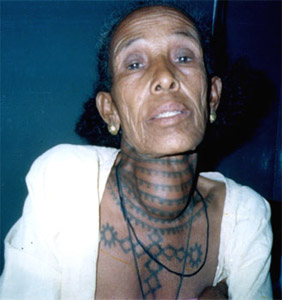 Goitre is of two types and these can be mentioned as simple goitre and exophthalmic goitre. In the latter the eyeballs protrude from their sockets. Goitre also called a bronchocele and this is actually a swelling in the neck due to an enlarged thyroid gland. This is situated across the front of the neck just below the larynx. The swelling of the gland may be only slight, or may be so great as almost to double the width of the neck. Goitre is more common in women than in men.
Goitre is of two types and these can be mentioned as simple goitre and exophthalmic goitre. In the latter the eyeballs protrude from their sockets. Goitre also called a bronchocele and this is actually a swelling in the neck due to an enlarged thyroid gland. This is situated across the front of the neck just below the larynx. The swelling of the gland may be only slight, or may be so great as almost to double the width of the neck. Goitre is more common in women than in men.
Goitre can occur as a normal feature of puberty and pregnancy and is not caused by disease. However, goitre can be caused by a range of factors that may need medical attention
Causes and Symptoms: Allopathy believes that simple goitre is caused by the lack of iodine in drinking water. The belief is based on the observation that it is endemic to certain areas where the water supply is deficient in iodine. But according to Ayurveda, goitre is the result of aggravation of kapha and diminution of pitta, which then lead to vitiation of matnsa and meda dhatus.
In simple goitre, there is a swelling in the neck region, which is well marked. Excessive growth may cause discomfort, and even lead to serious symptoms from its pressure on the windpipe, the food pipe, and also other parts of the neck.
Medicines & Prescriptions: Goitre can be cured by the administration of kanchanara (Bauhinia variegata). The bark of the tree is given in the form of a decoction. An ounce of the decoction is given twice daily on an empty stomach. A compound preparation, Kanchanara Guggulu, is recommended in a dose of one tablet, twice daily. The dose can be increased according to the severity of the disease. The ideal dose is four tablets, three times a day, followed by milk or water.
A standard Ayurvedic preparation, Amritadhaya Taila, should be given in two daily doses of 11 gm each.
Home Remedies: A fine paste made of the vegetable jalakumbhi i.e. Pistia straticies applied over the affected part helps in reducing the swelling. The juice obtained from the jalakumbhi should be given in doses of 11 to 22 gm a day. It increases the amount of iodine. According to Allopathy, the lack of Iodine is one of the factors responsible for the disease.
Diet and Other Regimen: According to Charaka, goitre does not strike those who take milk in adequate quantities. In addition, old rice, barley, moong dal, Bengal gram, cucumber, sugar juice, and milk products are recommended for a goitre patient. Sour and heavy substances are contraindicated.
Exercises of the neck are also recommended.




















